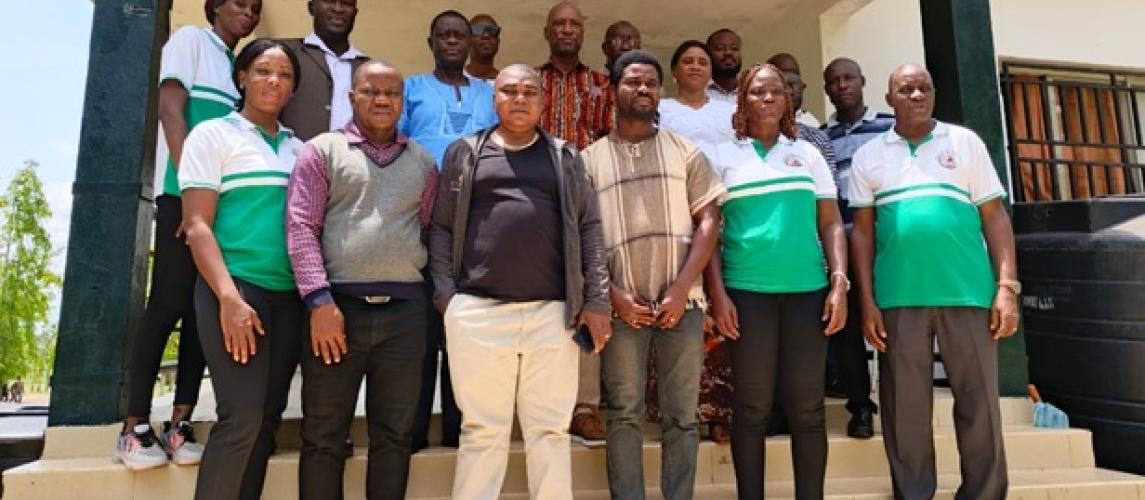
Liberia’s Poultry Sector Takes Bold Step For Self-Sufficiency, Reviving a Long-Awaited Poultry Development Strategy
By CARI Staff Writer
SUAKOKO, Liberia – Key players in Liberia’s poultry industry at a five-day consultative workshop leading to the pre-validation of the Poultry Development Strategy (PDS) have taken a bold step to boost self-sufficiency in poultry production and reduce dependency on meat, eggs, and feed imports into the country.
The event in Suakoko District marks a critical step toward reducing Liberia’s dependence on imported poultry and developing a self-sustaining domestic industry. Dubbed the Gbarnga Conference, it brought together poultry farmers, agricultural researchers, policymakers, academics, and local government representatives, all unified by a vision of revitalizing and regulating Liberia’s poultry sector.
Dr. Arthur Bob Karnuah, Director General of CARI and former Food and Agriculture Organization expert, explained that the National Poultry Strategy was first developed five to six years ago under FAO leadership and during the CDC administration. Despite strong groundwork and collaboration with stakeholders, the document remained inactive. “It is long overdue,” Dr. Karnuah said. “But it’s encouraging that the government is finally taking steps to validate the document and move the poultry sector forward. Liberia relies heavily on imported poultry products, which must change.”
Dr. Karnuah outlined the key components of the strategy, including comprehensive data collection by mapping poultry farmers across scales; manpower and training, feed production, and promoting local maize farming to produce feed.
Among other things, the Senior Researcher indicated that financing and government support, creating funding frameworks, updated statistics, aligning the strategy with current realities, processing, and infrastructure, establishing processing plants and hatcheries for a full poultry value chain are key in the development of the sector. “This is more than a document,” he emphasized. “It’s a roadmap for Liberia’s agricultural independence.”
Representing the Mayor of Gbarnga, Alex D. Mulbah Sr., administrative assistant, welcomed participants and pledged the city’s full support. “We have many small poultry farmers in Gbarnga. If this strategy is effectively implemented, it will help us organize them into cooperatives and promote local production,” Mulbah stated.
He also stressed the risks associated with imported poultry. “Imported poultry often arrives in poor condition, and our people unknowingly consume products that may be harmful. This policy is essential to promote healthier, locally-grown alternatives,” he added.
In his opening statement, David K. Akoi, Deputy Minister for Development and Planning at the Ministry of Agriculture, associated the strategy directly to President Joseph Nyuma Boakai’s ARREST Agenda (Agenda for Reform and Transformation), which emphasizes agribusiness, infrastructure, governance, human capital, sanitation, and tourism. (Liberia Endorses $8.4 Billion ARREST Agenda and County Development Plans.
“We must update this strategy to reflect today’s realities,” Akoi said. “It needs to account for climate resilience, production targets, and current data to ensure we meet the President’s goal of producing 500,000 birds annually.”
The Ministry’s budget has increased significantly, from under $5 million to over $13 million, with $8 million earmarked through the Public Sector Investment Program (PSIP) to support agriculture, including poultry, rice, cassava, and maize.
“This isn’t just about increasing poultry numbers,” Minister Akoi added. “It’s about linking farmers to markets, creating income, and improving food security.”
He stressed that the government prioritizes empowering local farmers over restricting imports. “We don’t need to place bans. We need to empower Liberian farmers. If they are producing quality maize for feed, then naturally, importers will turn to local options.”
Also commenting, Joseph N. Kodah Sr., President of the Liberia Poultry Federation, lauded the government’s commitment to validating the policy. “Today marks a major milestone,” he said. “For years, we’ve pushed for this policy to be validated. Thanks to the leadership of President Joseph N. Boakai and Agriculture Minister Dr. J. Alexander Nuetah, we are now making real progress.”
He criticized the current market, which he claims is flooded with expired or unsafe imported poultry. “Without regulations, business people import toxic, expired poultry products that harm our people. We’ve seen a rise in health issues, kidney failure, hypertension, rashes that we link to poor-quality imports,” Kodah warned.
The strategy also introduces a classification system for poultry farmers, small, medium, and large-scale, which will help better target support and investments. “You can’t treat all farmers the same,” he said. “This policy will help identify who needs what kind of support, from financing to market access.”
With the pre-validation exercise wrapping up, the next steps include incorporating stakeholder feedback, submitting the final draft to President Boakai for endorsement, and then forwarding it to the National Legislature for enactment into law.
Once passed, the National Poultry Strategy will provide a clear roadmap to elevate Liberia’s poultry sector, enhancing food security, creating jobs, increasing domestic production, and protecting consumers from unsafe imports.
As Kodah added, “This policy is the beginning of a new chapter. It will bring order, opportunity, and health to the Liberian poultry market.”
